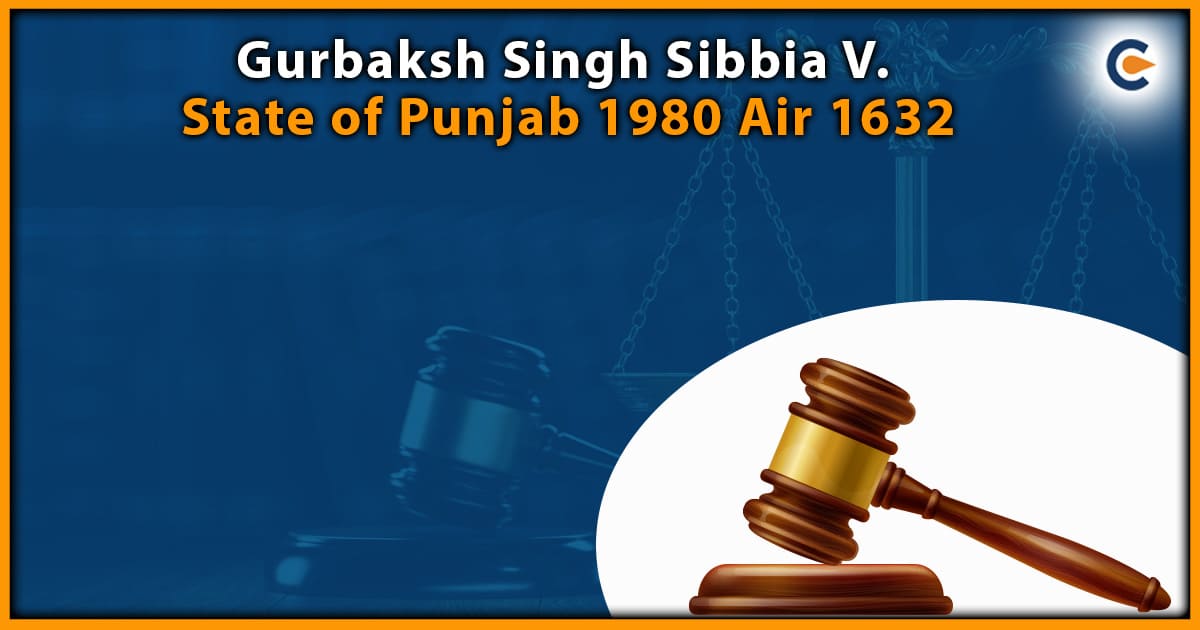Gurubaksh Singh Sibia v. State of Punjab is a landmark case in Indian criminal law that deals with the concept of “Anticipatory bail”. In 1980, the Supreme Court of India rendered a decision in the case that clarified the country’s laws regarding anticipatory bail.
Facts Of the Case
Gurubaksh Singh Sibia was a social worker and a member of the Punjab Legislative Assembly. In 1978, he was arrested and detained by the Punjab Police in connection with a criminal case under the Terrorist Affected Areas (Special Courts) Act, 1975. He was released on bail after spending about a year in jail.
Subsequently, in 1979, he was apprehended and told that he might be arrested again in connection with the same case. He, therefore, filed an application for anticipatory bail under Sec. 438 of the Criminal Procedure Code (Cr.P.C.)[1] before the Punjab and Haryana High Court. The High Court, however, dismissed his application on the ground that Section 438 did not apply to cases arising out of the Terrorist Affected Areas (Special Courts) Act, 1975.
Sibia then approached the Supreme Court of India, challenging the High Court’s order.
Legal Issues
The primary legal issue before the Supreme Court in this case was whether the provisions of Section 438 of the Cr.P.C. applied to cases arising out of the Terrorist Affected Areas (Special Courts) Act, 1975. The other issue was the interpretation and scope of Sec. 438 of the Cr.P.C.
Judgment
The Supreme Court held that the provisions of Sec. 438 of the Cr.P.C. applied to cases arising out of the Terrorist Affected Areas (Special Courts) Act, 1975. The court further held that the power to grant anticipatory bail was an extraordinary power and should be exercised with care and caution.
The court also held that the power to grant anticipatory bail was discretionary, and the authorities had to exercise this power objectively. The court observed that the power to grant anticipatory bail was open to correction by higher courts.
The court held that anticipatory bail was not an absolute right, and it should not be granted as a matter of routine. The court emphasized that the applicant must show that he has a reasonable apprehension of arrest in a non-bailable offence and that he would be denied bail if arrested.
The court also clarified that anticipatory bail could be granted subject to appropriate conditions, such as cooperating with the investigation, not leaving the country without the court’s permission, and surrendering to the police if required.
Significance
The Gurubaksh Singh Sibia case is significant as it clarified the law on anticipatory bail in India. The case laid down the principles governing the grant of anticipatory bail and emphasized that this power should be exercised with care and caution. The case has since become a landmark in Indian jurisprudence, and the principles laid down in this case have been applied in subsequent cases involving anticipatory bail.
The Supreme Court in this case also held that the interpretation of Section 438 of the Cr.P.C. did not arise in the case and that the case was mainly concerned with Rule 184 of the Defence and Internal Security of India Rules, 1971, and whether Section 438 applied in such a situation.
The Court observed that the language of Section 438 of the Cr.P.C. was wide enough to include any offence, including those arising out of special Acts. The Court noted that the language used in Section 438 was “offence,” which was a term of general import and included all offences, including those under special Acts.
The Court also observed that the special Acts provided for specific provisions for bail and that the provisions of such Acts would not affect the power of the Court to grant anticipatory bail under Section 438 of the Cr.P.C.
The Court emphasized that the power to grant anticipatory bail was a discretionary power and that the authorities had to exercise this power judiciously. The Court held that the grant of anticipatory bail should be subject to appropriate conditions to ensure that the applicant cooperates with the investigation and does not misuse the liberty granted to him Furthermore, the Supreme Court in this case also emphasized that the right to personal liberty was a fundamental right, and the power to grant anticipatory bail was an essential tool to protect this right. The court held that the right to personal liberty could not be curtailed unless it was done in accordance with the procedure established by law. The judgment in this case has had far-reaching consequences in the Indian legal system. It has not only clarified the law on anticipatory bail but has also emphasized the importance of protecting the fundamental right to personal liberty. The principles laid down in this case have been used by courts across the country while deciding on applications for anticipatory bail. The judgment has also had an impact on the legislative process, with the legislature amending the Cr.P.C. in 2005 to make the provisions relating to anticipatory bail more stringent. The amendment requires the court to take into account the nature and gravity of the offence while deciding on an application for anticipatory bail. In conclusion, the Gurubaksh Singh Sibia case is a landmark judgment that has had a significant impact on the Indian legal system. The case has clarified the law on anticipatory bail and emphasized the importance of protecting the fundamental right to personal liberty. The principles laid down in this case have been used in subsequent cases and have helped in the development of Indian jurisprudence.
Moreover, the judgment in the Gurubaksh Singh Sibia case has also been instrumental in balancing the interests of the accused with those of the society at large. While granting anticipatory bail, the court has to ensure that the accused doesn’t evade the process of law and cooperates with the investigation, and at the same-time, it also has to ensure that the accused’s right to personal liberty is not unduly curtailed. The court’s observations in this case have also been cited by various other courts while deciding on related issues such as the scope of Section 438 of the Cr.P.C., the discretion to grant anticipatory bail, and the conditions that can be imposed while granting anticipatory bail. Additionally, the judgment has also been significant in shaping the legal discourse on the issue of preventive detention in India. The court, in this case, have observed that the power to grant anticipatory bail was an essential safeguard against the arbitrary exercise of preventive detention powers by the state. The case has also been significant in setting the stage for judicial activism in India, with the court using its powers to interpret the law and protect fundamental rights. The judgment in this case is an example of how the judiciary, through its interpretation of the law, can play a crucial role in shaping the legal and social discourse in the country. In conclusion, the Gurubaksh Singh Sibia case is a landmark judgment that has had a profound impact on the Indian legal system. The case has clarified the law on anticipatory bail and emphasized the importance of protecting the fundamental right to personal liberty. The principles laid down in this case have been used in subsequent cases and have helped in the development of Indian jurisprudence. The judgment has also been significant in shaping the legal discourse on the issue of preventive detention and in setting the stage for judicial activism in India.
Conclusion
Gurubaksh Singh Sibia v. State of Punjab is a landmark case in Indian criminal law that clarified the concept of “Anticipatory bail” in India. In this case, Sibia, who was arrested and detained in connection with a criminal case, filed an application for anticipatory bail present before the High Court, which was dismissed. He then approached the Supreme Court of India, which held that the provisions of Section 438 of the Criminal Procedure Code applied to cases arising out of the Terrorist Affected Areas (Special Courts) Act, 1975. The Court clarified that the power to grant anticipatory bail was an extraordinary power that should be exercised with care and caution. The Court emphasized that anticipatory bail was not an absolute right and should be granted subject to appropriate conditions. The case has become a landmark in Indian jurisprudence, and the principles laid down in this case have been applied in subsequent cases involving anticipatory bail.











